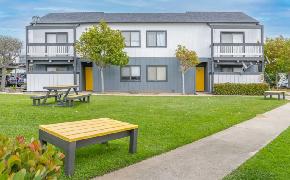 Industrial has been one of the winners amid the pandemic disruption. Amazon stock, for example, has surged to a record price, an event that is some indicator of how industrial real estate could be impacted. For CapRock Partners, an industrial developer and owner, lease deals that began negotiations before the onset of the pandemic have made their way to completion, a total of some 600,000 square feet of leasing activity across its portfolio.
Industrial has been one of the winners amid the pandemic disruption. Amazon stock, for example, has surged to a record price, an event that is some indicator of how industrial real estate could be impacted. For CapRock Partners, an industrial developer and owner, lease deals that began negotiations before the onset of the pandemic have made their way to completion, a total of some 600,000 square feet of leasing activity across its portfolio.
“Across our portfolio since March 1, we have either leases signed or out for signature of approximately 600,000 square feet,” Jon Pharris, co-founder and president of CapRock Partners, tells GlobeSt.com. “Those all have corporate board approvals and some are fully executed. So, we are seeing deals get done; however, those were deals that had been negotiated before the pandemic started.”
While lease deals haven’t canceled during this event, CapRock still anticipated rent relief and rent referral requests across their portfolio. “Most of our tenants are larger scale, because we are very focused on credit,” says Pharris. “That being said, we are expecting to receive rent abatement requests or rent deferral requests. Every landlord will experience that across their portfolio. We are going to take proactive steps with our tenants so that they can understand how the change in the economy has impacted their business, and just as important, to make sure that they understand the CARES program and how the federal relief can benefit them. We want to be a partner with them in that process.”
In the long-run, Pharris expects that there will almost certainly be an impact on real estate values, whether because of frozen debt markets or because of decreases in net operating income—or both. “Values will absolutely be impacted, but the degree to which they will be impacted is still unknown. It will take 6 to 12 months to see the ramifications or the impact of value decline,” he says. Given that banks are reducing their lending, that will have a significant driver on the value of real estate, even if net operating income remains the same. If rental rates decline, which is a real possibility, especially the longer this pandemic goes, that will have another impact on the valuations in real estate.”
If there is a decline in value, however, industrial is still well positioned to whether the storm—although there is still too much uncertainty to know how bad the storm will be. “Whether we are going to have a decline in values because of capital markets and a decline in values because of net operating income decline, industrial is the most resilient with office, retail and hospitality being the most vulnerable. Right now, it is too early to tell,” adds Pharris.
When trouble strikes, prudent investors return to core values, and CapRock is no different. While it isn’t necessarily hitting the pause button, the firm is practicing caution. “We are sticking to our roots, and right now, we are more focused on risk mitigation than expansion,” says Pharris. No one knows when the pandemic will stop. Right now, we are considering opportunities, and it is a case-by-case basis. We are looking to make appropriate investments, but we are thoughtful and prudent.”

















 Copyright © 2024 ALM Global, LLC. All Rights Reserved.
Copyright © 2024 ALM Global, LLC. All Rights Reserved.